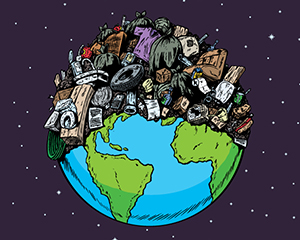Open The Door Just As Poisonousness
The police strike on a junkyard on the edges of Bangkok had all the features of a medication bust. Amassing onto the open-air property in late May, officers from the Imperial Thai Police discovered undocumented workers from Laos and Myanmar engaged in dangerous work that exposed them to impacts of poisonous fumes and residue — a typical risk on the lowest bar of their illegal and blasting international trade. The items these workers handled, however, were not heroin or methamphetamines but rather huge piles of discarded computers, electrical wires, and circuit sheets. Furthermore, all things considered, quite a bit of this electronic waste came from one of the world's biggest producers: the United States. E-waste Company In Bangalore.
 |
| E-waste Company In Bangalore. |
E-waste has become the world's fastest-developing junk stream. For us all who have discarded a phone or computer for a newer, sleeker model, the reasons are not really a mystery. In any case, the development is staggering: The worldwide aggregation of e-waste has more than doubled over the most recent nine years. In 2016, as indicated by the United Countries University, a worldwide research organization that tracks the problem, the yearly aggregation reached 49.3 million tons — enough to fill more than a million 18-wheel trucks stretching from New York to Bangkok and back. By 2021, the yearly absolute is predicted to outperform 57 million tons.
Despite being the world's second-largest producer — China recently claimed the best position — the United States is the main developed nation that hasn't ratified the Basel Convention on risky waste, a treaty that restricts the exports of e-waste and that hosts the help of 186 gatherings. Moreover, the United States has no public law for overseeing e-waste, leaving the issue to the states. (Fifteen states actually have no e-waste legislation in effect.) The European Association, on the other hand, has some of the toughest enforcement of e-waste laws on the planet, restricting exports to developing countries and compelling manufacturers to help finance recycling. Europe's recycling rates for electronics — around 35 percent overall — are a lot higher than the American rate. "The U.S. has consistently been the elephant in room that no one needs to discuss," says Deepali Sinha Khetriwal, a Mumbai-based research associate at the United Countries University. "Until it decides to have an impact, we can't really solve the problem of e-waste shipments." E-waste Company In Bangalore.
The gold on the planet's e-waste alone equals more than a tenth of the gold mined around the world each year. But a lot of this treasure is essentially reburied in landfills.
 |
| E-waste Company In Bangalore. |
The main part of used electronics shipped to the developing scene is meant to give second and third lives to devices and help bridge the world's computerized divide. Be that as it may, the shroud of "reuse and repair" is often used to hide illegal exports of e-waste. This is ostensibly scrapped, however, the frenzy of dangerous e-waste movement in cities in Pakistan and Ghana, for example, testifies to the riches hidden in the piles of discarded electronics. As per researchers at U.N.U., the crude materials contained in e-waste were worth generally $61 billion of every 2016, more than the GDP of even middle-income countries like Croatia or Costa Rica. E-waste Company In Bangalore.
The idealistic vision of a roundabout economy is far off, however. E-waste recycling remains determinedly low in many pieces of the world. Even the extraction of precious metals has proved difficult for companies to capitalize on. Furthermore, the remaining mass of e-waste — essentially plastics laced with metals, chemicals and flame retardant — pose a more intractable problem. The recycling of these complex plastics would likely need to be subsidized or enforced through legislation — and few countries outside Europe or Japan have indicated the commitment to make that happen.








0 Comments